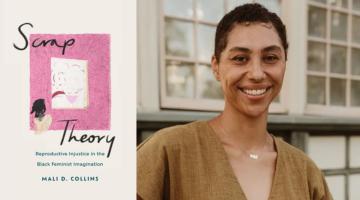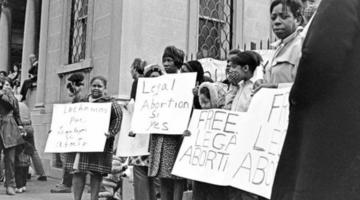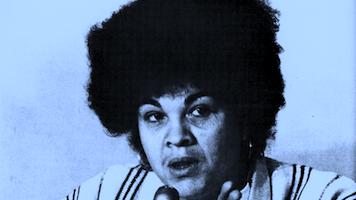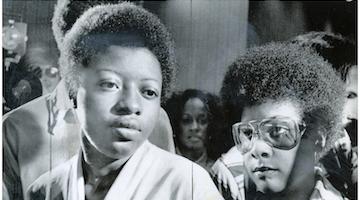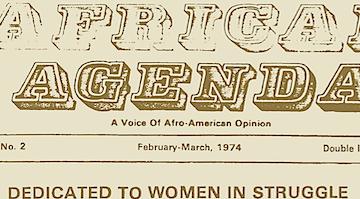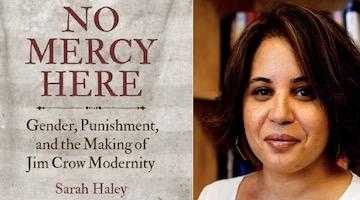Mothers and infants consistently experience positive health outcomes when midwives are incorporated into healthcare systems.
“Emergent professionals, governments, enslavers, and abolitionists seeking to control women’s reproduction discredited midwives and women as ignorant, unskilled, and superstitious.”
In this series, we ask acclaimed authors to answer five questions about their book. This week’s featured author is Sasha Turner. Turner is Associate Professor of History at Johns Hopkins University. Her book is Contested Bodies: Pregnancy, Childrearing, and Slavery in Jamaica.
Roberto Sirvent: How can your book help BAR readers understand the current political and social climate?
Sasha Turner: For several months between 2015 and 2018 Jamaica media outlets headlined their daily reports and broadcasts with the deaths of several newborns, in what became known as the “dead babies scandal,” bringing well needed attention to the crisis in maternity and neonatal health. At the island’s leading maternity hospital, Victoria Jubilee, seven newborns reportedly died over a three-month period alone between August and October 2018, surpassing global annual rates of 19 per 100,000. The breaking of similar stories here in the United States reveals a worrying predicament in maternal, neonatal, and infant health. Maternity health complications have doubled globally over the past twenty years, and in places like America, where racism worsens health disparities, rates have tripled and quadrupled in counties with large black populations. In addition to authority’s failure to act responsively, solutions presented by activists and researchers have been ignored or actively rejected by hospitals and doctors. Chief among such solutions is the strengthening of partnerships between midwives, who deliver skilled attendance during childbirth, and providers of emergency obstetric care. Several studies, including a 2003 World Bank Publication, have shown mothers and infants consistently experiencing positive health outcomes when midwives are incorporated into healthcare systems. The integration of midwives into healthcare systems has been slowed or outrightly rejected by hostile doctors and hospitals with the backing of restrictive laws and policies that prohibit or limit midwives practicing.
“Maternity health complications have doubled globally over the past twenty years in places with large black populations.”
My book helps readers understand the historic roots of such hostility and restrictive policies toward midwives by examining the contested and contentious relationship between community based, lay birth attendants (midwives) and scientific, professional approaches to childbirth (what eventually became obstetrics) in late eighteenth- and early nineteenth- century Jamaica. Telling the story of enslaved mothers and midwives reveals the contested relations between lay and professional approaches to childbirth were rooted in the struggle for the control of women’s bodies and reproductive ability. Emergent professionals seeking knowledge about and access to women’s reproductive bodies in addition to governments, enslavers, and abolitionists seeking to control women’s reproduction discredited midwives and women as ignorant, unskilled, and superstitious. The marginalization midwives face today, along with erroneous assumptions that they are unskilled, are among the legacies of the contested relations between lay and professional practitioners. Placing midwives in their rightful positions attending to the needs of mothers and their babies and integrated into healthcare systems require understanding how, in the first place, we came to view midwives as inherently bad for maternal health.
What do you hope activists and community organizers will take away from reading your book?
One of the most distinctive struggles I endured as a new mother was over breast feeding. My decision to nurse well beyond six months and in public was curious to some, but deeply disturbing to many. Still others were amused when my now five-year-old reached down into my clothes, snuggled up to my chest, mostly to soothe herself, but sometimes, especially when she got the critical or curious eye from onlookers, to provoke a response. Despite disapproving audiences and emboldened by my research, I pushed back against the boundaries of decorous nursing and early weaning. I understood that we have inherited many restrictive ideas about nursing from a protracted, and multi-front war waged primarily by men to promote their own agenda by controlling women’s bodies. Restrictions on lactation periods and midwives and community caregivers attending to childbearing women were outgrowths of the political, moral, and economic ambitions of abolitionists, enslavers, physicians, and public officials – collectively pronatalism. Parliamentary abolitionists balanced imperial interests in maintaining colonial stability against their moral outrage at the trafficking of Africans by proposing enslaved women reproduce the labor force as an alternative to the trade in enslaved people. Plantation owners and managers made cost-benefit analyses of how intervening in the reproductive lives of women impacted the productivity and profitability of their estates. Male physicians bolstered their emergent profession, which relied on gaining access to women’s reproductive bodies and private and exclusive birth chambers by maligning midwives and birth attendants.
“Restrictions on lactation periods and midwives were outgrowths of the political, moral, and economic ambitions of abolitionists, enslavers, physicians, and public officials.”
Although many of their prescriptions served little purpose beyond distinguishing black mothers from white and the wealthy from the poor, pronatalism promised lifesaving changes. Legislative provisions for expectant mothers’ work release; increasing food, clothing, and housing rations for women with families; and professionalizing and modernizing maternal and infant care potentially improved women’s childbearing health. Many of these policies remained just that. They were never implemented or only implemented partially because women’s childbearing interests and practices were not always compatible with those of reformers. My book adds to the growing body of work making it clear that far too many policies concerning women’s reproductive health emerge from considerations not necessarily based on what best guarantees optimal maternal and infant health, or even includes women in the conversation. In our pursuit of reproductive justice and autonomy, we must distinguish between policies that prioritize the health of mothers and children and ones motivated by other ambitions, many of which are at odds with women’s rights.
We know readers will learn a lot from your book, but what do you hope readers will un-learn? In other words, is there a particular ideology you’re hoping to dismantle?
While medical professionals maintained a deep distrust of midwives and community caregivers, many others viewed women’s power over reproduction as threatening. Eighteenth century stakeholders in childbearing, from government officials and abolitionists to enslavers and doctors, blamed Jamaica’s demographic failure on enslaved women’s so-called addiction to abortion and the supposed ineptitude of midwives. Some argued that enslaved women were naturally promiscuous and resorted to abortion to conceal sexual impropriety. Presumably, permitting women full control over reproduction, including access to abortion, not only threatened stable population growth, it also endangered colonial morality by permitting sexual impropriety to go unchecked. When we talk about reproductive justice, most people assume is it all about abortion. Women’s rights to abortion is but a fraction of what we mean by reproductive justice. Reproductive justice means promoting and securing the health and wellbeing of women and their families through quality care that both prevents and treats.
In eighteenth-century Jamaica, the problem of population growth was also interpreted as the problem of incompetent midwives. Doctors, in particular, viewed midwives as unskillful, frequently blaming Jamaica’s high rates of infant mortality on what they viewed as women’s superstitious and barbaric practices. Plantation protocol dictating that midwives call in doctors only to assist with extremely difficult births, furthered the association of midwifery with incompetence. Most enslavers hoped to avoid the exorbitant cost of hiring physicians, and therefore permitted doctor intervention only for the most severe cases. Threatened by the wrath of their masters, enslaved midwives had to make calculated decisions about when to seek physician intervention. Enslavers ignored their own culpability in poor health outcomes for enslaved mothers by vilifying midwives as arrogantly pursuing difficult births. Coming into contact with laboring women primarily at moments of extreme birth complication fed physicians’ assumptions that midwives were arrogant and opposed to their intervention. Dismissing midwives as arrogant, incompetent, and superstitious, of course, worked to the advantage of physicians seeking to gain foothold in a world long the exclusive domain of women.
“Most enslavers hoped to avoid the exorbitant cost of hiring physicians.”
In addition to unlearning these myths it is also a mistake to assume that modern medicine was efficacious from its inception. Midwives, as well as plantation managers, rejected the intervention of physicians because, more often than not, their treatments were ineffective. Eighteenth-century medicine was still very much in a state of infancy, still at least a century away from some of the most significant breakthroughs that would eventually preserve maternal and infant health. Midwives, and enslaved healers more generally, had higher rates of success than physicians. Women, including midwives, made decisions on what they thought best ensured safe delivery, and sometimes this decision meant shielding laboring women from doctors, whom enslavers themselves also dismissed as quacks.
Who are the intellectual heroes that inspire your work?
This is often a difficult question for me, because there are far more intellectuals both within and beyond the academy who inspire me than I can ever name in a given scenario. Most immediately, I remain in awe of the theoretical clairvoyance of Jennifer Morgan, the late Stephanie Camp, Stephanie Smallwood, Marisa Fuentes, Hortense Spillers, Saidiya Hartman, Barbara Christian, and Toni Morrison. Their intellectual divining bears the imprint of the ancestors, who theorized to liberate because they understood, intuitively, that their being informed their knowing. It is always a joy to (re)read the works of Maya Angelou, Louise Bennett, and Clarissa Pinkola and to be reminded of the power of language, especially women’s storytelling. My writing is daily inspired by their prose and Thavolia Glymph’s reminder to help my audience see what I see. Eric Williams, Verene Shepherd, Hilary Beckles, and Deborah Gray White were my early inspiration. Well before I began my journey as a professional historian I knew of their work, and more importantly, the importance of history. Despite the now very tired and distracting claim of the historian as the “cloistered academic,” as Prof. Shepherd used to say, these historians have always defined the history they create in service of their communities. I return very often to Williams’s call for Caribbean people in particular to become students of history, not as academics, but as a necessary part of our ongoing decolonization struggle. I remain daily inspired by rule-breaking #everymeansnecessrytogetthewordout work of my contemporaries: Keisha N. Blain, Jessica Marie Johnson, Khalilah Brown-Dean, Moya Bailey, and Nikole Hannah-Jones. My daily toil would hardly be possible without the fierce love and sisterhood of: Shani Roper, Deirdre Cooper Owens, Natasha Lightfoot, Celia Naylor, Sowande Mustakeem, LaShawn Harris, Talitha LeFlouria, and Kennetta Perry who remind me to be gentle with myself and be daring with my scholarship.
In what way does your book help us imagine new worlds?
The year 2020 has produced the (potentially productive) coincidence of the COVID-19 pandemic and the WHO designated International Year of the Nurse and the Midwife. The pandemic’s crushing demand on healthcare workers brings full circle the WHO’s clarion call to increase access to healthcare, including greater investments in nursing and midwifery. The pandemic amplifies this call, exploding the fractures in the globe’s crumbling health infrastructure. These contemporary problems echo the eighteenth- and nineteenth- century world of my book. Until enslavers recognized how much their worlds depended on the health and reproductivity of enslaved women, they divested in women’s health and access to care. The demographic crisis amplified by the British Parliament’s ban on the trafficking of Africans impressed upon enslavers to invest in the health, housing, dietary, and social needs of enslaved mothers, including limiting family separation. Government also passed new protective laws for childbearing women and offered incentives to local authorities and individuals implementing legislation. The short-term economic costs of these investments, however, limited their implementation and scope. Adjusting women’s work schedules, increasing their rations and access to hospitals and doctors diverted labor and financial resources from the plantation. Fear of short-term losses blinded reformers to the long-term benefits to be gained from investing in women’s health. The reluctance of government, doctors, and enslavers to consider mothers and midwives as stakeholders invested in their health and that of their children and community, further limited the reach of reforms. In addition to the ongoing struggles over slavery and freedom, mothers, midwives, and reformers spent more time confronting each other rather than collaborating to resolve health problems. Perhaps modern medicine could have accomplished more and earlier if they approached professionalizing medicine by intentionally integrating lay practitioners. Midwives continued successfully attending to enslaved women’s childbearing needs, just as physicians eventually made life-saving medical breakthroughs. Contemplating the positive results of these efforts by practitioners working at extreme odds with one another, imagine how much more could be accomplished from community healers and professionals collaborating.
Roberto Sirvent is Professor of Political and Social Ethics at Hope International University in Fullerton, CA, and an Affiliate Scholar at Yale University’s Interdisciplinary Center for Bioethics, where he directs the Race, Bioethics, and Public Health Project. He is co-author, with fellow BAR contributor Danny Haiphong, of the book, American Exceptionalism and American Innocence: A People’s History of Fake News—From the Revolutionary War to the War on Terror.
COMMENTS?
Please join the conversation on Black Agenda Report's Facebook page at http://facebook.com/blackagendareport
Or, you can comment by emailing us at comments@blackagendareport.com

